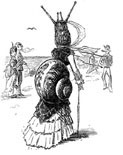
An Outsider’s Impressions of the Modern Mass
UH, MAY I SAY SOMETHING ?
It’s forty-five minutes into Mass, and the priest is engaged in the breaking of the Host. I can’t clearly see what he’s doing because I’m sitting at the back of the church, much as I used to sit at the back of the classroom during my school days. I have always preferred to have more people in front of me than behind me when I’m among strangers; perhaps that’s a flaw.
So I can’t easily see what’s going on, but I can hear plenty because microphones are being used. The church has one microphone at the podium where the readings are done, one affixed to the priest’s robes, and a handful — maybe four — used by the band.
While the priest does his duty, which I can’t clearly see, the pianist plays and the vocalists sing into their microphones:
“Doo-wah, doo-wah, doo-ooh-wah-ah, doo-wah….”
O.K., no. This isn’t true. Actually, they’re singing: “Lamb of God, you take away the sins of the world: have mercy on us.”
To me, though, not knowing any better, this verse and the slightly different ones that follow have the same impact as “doo-wah”: the words are filler, more supposed “joyful noise” to fill the silence and keep the congregation from forgetting the band is there. I’m thankful at least that the song director hasn’t picked up her bongos to pound along.
You May Also Enjoy
Bells are used to warn or to summon. Bells express just about every mood and exigency; they are joyful, somber, pragmatic, ceremonial.
There are no protagonists in the latest liturgical drama, only antagonists. Nobody comes out clean, neither traditionalists nor Pope Francis.
There is a Middle Eastern proverb that says one should not let the camel’s nose…

